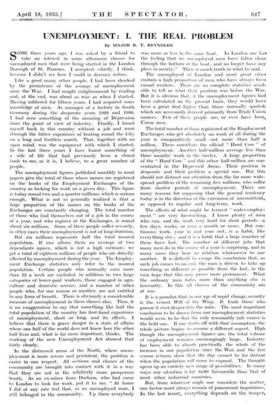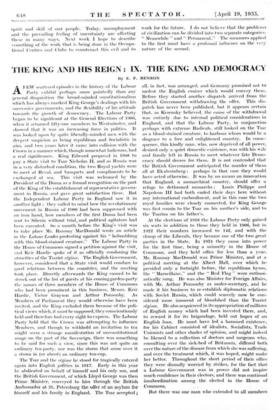UNEMPLOYMENT: I. THE REAL PROBLEM
By MAJOR B. T. REYNOLDS SOME three years ago, I was asked by a friend to take an interest in some afternoon classes for unemployed men that were being started in the London Borough of St. Pancras. I accepted—chiefly, I think, because I didn't see how I could in decency refuse.
Like a good many other people, I had been shocked by the persistence of the scourge of unemployment since the War. I had sought enlightenment by reading and, at the end, was about as wise as when I started. Having soldiered for fifteen years, I had acquired some knowledge of men. As manager of a factory in South Germany during the desperate years 1929 and 1930, I had . seen something of the meaning of Depression from the point of view of industry. Finally, I found myself back in this country without a job and went through the bitter experience of beating round the City on a long and fruitless search. That, together with au open mind, was the equipment with which I started. In the last three years I have learnt something of a side of life that had previously been a closed book to me, as it is, I believe, to a great number of people.
The unemployment figures published monthly in most papers give the total of those whose. names are registered un the .books of the Employment Exchanges of the country- as looking for work on a given day. This figure is today round two and a quarter millions, which is serious enough. What is not so generally realized is that a large proportion of the names on -the. books of the ExcharigeS are constantly changing. The total number of those who find themselves out of a job in the course Of a year, and who register at the Exchanges, is round about six millions. Some of these people suffer severely, in other cases their unemployment is not of long duration.
But six millions represents half the total insured population. If one allows them an average of two dependants apiece,. which is not a high estimate, we get a total of eighteen millions of people who are directly affected,by unemployment during the year. The Employ- ment Exchange statistics only . refer to the insured population. Certain people who normally earn more than ,E5 a week are excluded, in addition to two large categories of lower-paid workers, those engaged in agri- culture and domestic service, and a number of other people who, for one reason or another, are not entitled to any form of benefit. There is obviously a considerable measure of unemployment in these classes also. Thus, it is no exaggeration to say that something like half the total population of the country has first-hand experience of unemployment, short or king, and its effects. I believe that there is grave danger in. a state of affairs where one half of the world does not know how the other half lives and, what is far more important, thinks. The working of the new Unemployment Act showed that fairly clearly. .
• In the ;distressed areas of the North, where unem- ployment is more severe and persistent, the problem is easier in one respect. All sections and classes of the community are brought into contact with it in a way that they- are not in the relatively more prosperous South. As an ex-miner from Durham, who had come to London 'to look for work, put it to me, " At home I did at any rate feel that, as an unemployed- man, I still belonged to the community. Up there everybody was more or less in the same boat. In London one has the feeling that we unemployed men have fallen clean through the bottom of the boat, and no longer have any place in society." There is much truth in what he said.
The unemployed of London and most great cities contain a high proportion of men who have always been casual workers. There are no complete statistics avail- able to tell us what their position was before the War. But it is obvious that, if the unemployment figures had been calculated on the present basis, they would have been a great deal higher than those normally quoted. which are necessarily derived primarily from Trade Union sources. Few of these people are, or ever have been, Union men.
The total number of those registered at the Employment Exchanges who get absolutely no work at all during the year is comparatively small—not more than half a million. These constitute the official " Hard Core " of unemployment. Another half-million average less than three months' work in the twelve. A large proportion of the " Hard Core " and this other half-million are con- centrated in the Depressed Areas. Their position is desperate and their problem a special one. But this should not distract our attention frOm the far more wide- spread problem of the remaining five millions, who suffer from shorter periods of unemployment. There are many reasons for supposing that the general tendency today is in the direction of the extension of intermittent, as opposed to regular and long-term, work.
The effects of what might be termed " under-employ- ment " are very far-reaching. I know plenty of men who can, and do, work very hard for short periods—a few days, weeks, or even a month or more. But con- tinuous work, year in and year out, is a habit, like everything else ; and it is a habit that a large number of them have lost. The number of different jobs that many men do in the course of a year is surprising, and in many cases they bear no relation whatsoever to -one another. It is difficult to escape the conclusion that, as each job comes to an end, the man is driven to take up something as different as possible from the last, in the vain hope that this may prove more permanent. What the ordinary man hates more than anything else is insecurity. In this all classes of the community are at one.
It is a paradox that, in our age of rapid change, security is the veriest Will of the Wisp. It leads those who pursue it ever deeper into the mire. The most important conclusion to be drawn from our unemployment statistics would seem to be that the only reasonably safe course is the bold one. If one starts off with that assumption, the whole picture begins to assume a different aspect. High though the unemployment figures are, the total volume of employment remains encouragingly large. Industry has been able to absorb practically the whole of the increase in our population since the 'War, and the last census returns show that the day cannot be far distant when the population will cease to expand. The thought opens up an entirely new range of possibilities. In many ways our situation is far more favourable than that of most other industrial countries.
• But, from whatever angle one considers the matter, one factor must always remain of paramount importance, In the last resort, everything depends on the temper, spirit and skill of our people. Today, unemployment and the prevailing feeling of uncertainty are affecting these in many ways. Net week I hope to describe something of the work that is being done in the Occupa- tional Centres and Clubs to counteract this evil and to work for the future. I do not believe that the problems of civilization can be divided into two separate categories. " Meanwhile " and " Permanent." The measures applied to the first must have a profound influence on the very nature of the second.







































 Previous page
Previous page